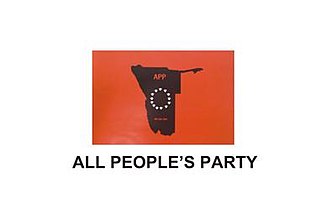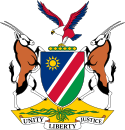
South West Africa was the name for modern-day Namibia when it was under South African administration, from 1915 to 1990.

The South West Africa People’s Organisation (SWAPO), officially known as SWAPO Party of Namibia, is a political party and former independence movement in Namibia. It has been the governing party in Namibia since the country achieved independence in 1990. The party continues to be dominated in number and influence by the Ovambo ethnic group.

The President of the Republic of Namibia is the head of state and the head of government of Namibia, as well as the commander-in-chief of the Namibia Defence Force, according to the Constitution of Namibia.

The Prime Minister of the Republic of Namibia is the leader of the Government of Namibia. The Prime Minister is appointed by the President of Namibia and co-ordinates the work of the Cabinet. They also advise and assist the President in the execution of the functions of Government.

The Popular Democratic Movement (PDM), formerly the Democratic Turnhalle Alliance (DTA), is an amalgamation of political parties in Namibia, registered as one singular party for representation purposes. In coalition with the United Democratic Front, it formed the official opposition in Parliament until the parliamentary elections in 2009. The party currently holds five seats in the Namibian National Assembly, one seat in the Namibian National Council and is the official opposition. McHenry Venaani is president of the PDM.

The Herstigte Nasionale Party is a South African political party which was formed as a far-right splinter group of the now defunct National Party in 1969. The party name was commonly abbreviated as HNP, although colloquially they were also known as the Herstigtes.

Action Christian National (ACN) was a white nationalist political party in Namibia. The ACN was established in 1989 to enable whites to participate in the elections. It used to be aligned with the National Party of South Africa. In the Namibian parliamentary election, 1989 that elected the members of the Constituent Assembly of Namibia, ACN won three seats. The party's chairman was Jan de Wet. It subsequently became the Monitor Action Group.

The Christian Democratic Action for Social Justice (CDA) was a political party in Namibia.

The Namibia Christian Democratic Party was a political party in Namibia, led by Hans Röhr. It was founded in 1978 in Kavango. Wolfgang Adam was the honorary president of the party.
The Namibian is the largest daily newspaper in Namibia. It is published in English and a section in Oshiwambo on Fridays.

The Transitional Government of National Unity (TGNU), also commonly called the Interim Government, was the interim government of South-West Africa (Namibia) from June 1985 to February 1989.

The Turnhalle Constitutional Conference was a controversial conference held in Windhoek between 1975 and 1977, tasked with the development of a constitution for a self-governed Namibia under South African control. Sponsored by the South African government, the Turnhalle Conference laid the framework for the government of South West Africa from 1977 to independence in 1989.

The All People's Party (APP) is a political party in Namibia.
Ebenezer van Zijl was a White Namibian politician and lawyer in South West Africa, the forerunner to modern Namibia.
The Federal Convention of Namibia (FCN) was a political party based in Rehoboth, Namibia. It was created in the wake of Namibian independence in 1988 by a merger of several smaller parties and gained a seat in the Namibian Constituent Assembly. After also-ran results in 1994 and 1999 it ceased to be publicly active.
The National Patriotic Front was a political party in Namibia.
The Democratic Coalition of Namibia was a political party in Namibia.










